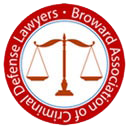Hassett & Associates, P.A.
Call 24/7 - (954) 791-3939 | Hablamos Español
Most people who are charged with theft do not have experience with the criminal justice system and are first-time offenders. Hassett & Associates, P.A. represents people of all ages who are facing a broad variety of theft charges. Attorney Kenneth P. Hassett challenges the charges his clients are facing during every phase of the criminal court process.
Whether you are charged with a misdemeanor or felony offense, it is important for you to reach out to Hassett & Associates, P.A. as soon as possible. Attorney Hassett can help you understand your legal options and your rights, the penalties you are facing, and the defenses that might be available to you.
Under § 812.014, Fla. Stat. (2022), you can be charged with a theft offense if you knowingly take or try to take or use the property owned by someone else without authorization and with the intent to permanently or temporarily deprive the owner of their right to the property. You can also face theft charges if you use the property for your benefit or for the benefit of any other person who is not entitled to the property. Beyond this general definition, multiple types of theft offenses range in levels of severity based on the value of the property taken and its type.
In some cases, people are charged with theft after someone else makes false allegations against them. If you have been falsely accused of theft and have been charged, you should reach out to Fort Lauderdale criminal defense lawyer Kenneth P. Hassett immediately so that he can address your situation before the prosecutor decides whether to file formal charges against you.
In some cases, an attorney can convince the prosecutor not to file formal charges when the arrest resulted from false accusations.
Here are some common theft crimes that might be filed in Florida.
Shoplifting offenses are the most common types of theft charges that are filed in Florida. Known as retail theft, shoplifting might be charged as a misdemeanor or felony based on the value of the property that was taken.
Many people who are charged with petit theft do not have criminal records. They might be minors or adults. People without criminal records often find the criminal process overwhelming and fear what might happen to them if they are convicted of theft.
Like other counties, Broward County offers a diversion program for first-time offenders. If you enter a diversion program, your theft case will be handled outside of the criminal justice system so that you can avoid having a criminal record. However, the retailer can still pursue a civil case to recover damages, making it important for you to have an experienced Fort Lauderdale criminal defense lawyer to defend you against your charges.
The penalties for shoplifting/retail theft are based on the value of the property that was taken as described below.
Retail theft of an item valued at less than $100 carries the following potential penalties:
If the property taken was valued at more than $100 but less than $750, the penalties include the following:
If you have two or more previous theft convictions of any type, a petit theft conviction can include the following penalties:
If the property that was taken was valued at $750 or more, you will face the following penalties if convicted:
It is important to note that theft of property from a home can be charged as grand theft even if the property is valued between $100 and less than $750. Grand theft is a felony.
Florida classifies theft offenses as petit theft or grand theft based on the value of the property and/or the item stolen. The various theft offense classifications are discussed below.
Second-degree petit theft is the least severe theft crime in Florida. You can face this charge if you steal something valued at under $100. The penalties for a conviction include a maximum jail sentence of 60 days and a fine of up to $500.
You can be charged with first-degree petit theft if you steal something worth between $150 and $749. This offense is a first-degree misdemeanor with a maximum jail sentence of 12 months in jail and a $1,000 fine.
You can be charged with third-degree grand theft if you steal something valued at $750 or more or steal certain types of property, including guns, wills, cars, and others. You can also face a third-degree grand theft charge if you steal something valued between $100 and $750 from a home even though its value is less than $750. If you are convicted, you will face a maximum of five years in prison and a $5,000 fine.
Second-degree grand theft can be charged if you take property worth from $20,000 up to $99,999, cargo valued up to $49,999, or emergency equipment worth at least $300. If you are convicted of second-degree grand theft, you can face a maximum prison sentence of 15 years and a $10,000 fine.
First-degree grand theft can be charged if you steal property worth $100,000 or more. You can also be charged with first-degree grand theft if you steal and use a car and cause more than $1,000 in damage to property and real estate or steal cargo worth more than $50,000. If you are convicted of this offense, you can face a maximum prison sentence of 30 years and a $10,000 fine.
Under § 812.0145, Fla. Stat. (2022), you can face enhanced penalties if you steal property valued at $1,000 or more from someone who is 65 or older. If you do, the court will order you to pay restitution to the victim and complete a minimum of 500 hours of community service. These penalties are in addition to any jail sentence or fine that the court might order.
If you are convicted of stealing from someone who is 65 or older and are fully aware of the age of the victim, you will face the following penalties based on the value of the property:
Employee theft and embezzlement are serious problems for Florida businesses and are treated harshly under the law. A conviction for embezzlement can come with serious penalties even if the defendant does not have a previous criminal record. If you are facing accusations of employee theft or embezzlement, you should talk to Fort Lauderdale theft lawyer Kenneth P. Hassett immediately before you agree to speak with law enforcement or your employer about the accusations.
Under § 812.016, Fla. Stat. (2022), a property dealer who knows that the identifying features, including serial numbers or permanent labels, have been removed from the property in their possession can be charged with a first-degree misdemeanor. This offense is classified as a theft crime with a maximum sentence of 12 months in jail and a $1,000 fine.
If you write a worthless check to buy property, you can face criminal charges under § 832.05, Fla. Stat. (2022). You can be charged with this offense if you obtain services or property from someone else by giving them a check that you know you do not have enough money to cover.
Some potential defenses that might be available to passing a worthless check include the following:
If you stop payment on a check after writing it, you can’t be charged with passing a worthless check to obtain property. Similarly, if you forge a check, you can’t be charged with this offense. However, you can be charged with forgery.
The recipient can’t have a reason to believe that the drafter’s account does not have sufficient funds solely based on the fact that the drafter had previously given the recipient a worthless check. Paying a dishonored check or bank draft will not count as a viable defense against passing a worthless check charge.
If you wrote a worthless check while knowing that you had insufficient funds to cover it, the penalties you will face will depend on the value. If it was for less than $150, it is a first-degree misdemeanor with a maximum jail sentence of 12 months and a $1,000 fine. If it was written for $150 or more, you can be charged with a third-degree felony with a maximum prison sentence of five years and a $5,000 fine.
In Florida, trafficking means selling, transferring, or distributing property or buying the stolen property with the intent to sell the items. Under § 812.019, Fla. Stat. (2022), you can be charged with the crime of dealing in stolen property if you intentionally and knowingly traffic in property that you knew was stolen. If you are convicted of this offense, you will be penalized for a second-degree felony with a potential maximum sentence of 15 years in prison and a $10,000 fine.
If you orchestrate the theft of the property and then traffic it, you can be charged and convicted of a first-degree felony and face a maximum sentence of 30 years in prison and a $10,000 fine.
If you use the internet to sell or offer to sell any property that you know or reasonably should know is stolen, you can be charged with a crime under § 812.0195, Fla. Stat. (2022). The penalties you will face will depend on the value of the property involved.
If the property was valued at less than $300, you will face a second-degree misdemeanor with a maximum jail sentence of 60 days and a $500 fine. If the property was valued at $300 or more, you will be charged with a third-degree felony with a maximum potential prison sentence of five years and a $5,000 fine.
Businesses have vested interests in protecting their trade secrets, and the theft of trade secrets can cause extensive harm to companies. Because of this, the theft of trade secrets is illegal in Florida. Under § 812.081, Fla. Stat. (2022), you can be charged with theft of business trade secrets if you steal a business’s trade secret or attempt to steal it with the intention of selling it for personal gain. This offense is a third-degree felony with a potential maximum sentence of five years in prison and a $5,000 fine.
Even if you try to return the trade secret or intended to do so, it is not a defense against the crime of theft of a business trade secret.
Several related crimes can be charged by prosecutors in Florida. These offenses are related to theft crimes but include additional factors. Here are several you should know.
Under § 539.001(8)(8), Fla. Stat. (2022), it is illegal to give false information about your ownership of property that you are attempting to pawn to a pawnbroker. You can also be charged with this offense if you give false identity information to a pawnbroker.
For example, if a friend of yours gives you an item and asks you to pawn it for them, you can be charged with a crime if you falsely state that you own the item when you fill out the pawnbroker’s form. Only the owner of the property can pawn it. You could similarly be charged with this offense if you falsely claim your friend’s identity to pawn the item.
If you receive money from a pawnbroker after providing false information, your charge will depend on the value of the money you receive. If you receive less than $300, you can be charged with a third-degree felony and face up to five years in prison and a fine of up to $5,000. If you receive $300 or more after giving the pawnbroker false information, you can be charged with a second-degree felony and face up to 15 years in prison and a fine of up to $10,000.
If you rent property in Florida and fail to return it after receiving proper notice, you can be charged with a crime under § 812.155, Fla. Stat. (2022). You can face several offenses under this statute based on your actions.
If you make false representations or use tricks to obtain the property, you can be charged with a second-degree misdemeanor carrying up to 60 days in jail and a fine of up to $500 if the property’s value is less than $300. If it is worth $300 or more, you can be charged with a third-degree felony and face prison of up to five years and a $5,000 fine.
If you lease a property with the intent to defraud the owner, you can also be charged under this statute. If the property is valued at less than $300, it is a second-degree misdemeanor with a potential sentence of up to 60 days in jail and a fine of up to $500. If it is valued at more than $300, it is a third-degree felony with a potential sentence of up to five years in prison and a $5,000 fine.
Finally, if you fail to return the rental property at the end of the rental period or after receiving proper notice, or if you abandon the rental property instead of returning it, you can face charges based on the value of the rental property. If it is worth less than $300, you can be charged with a second-degree misdemeanor with a potential sentence of up to 60 days in jail and a $500 fine. If it is valued at $300 or more, you can be charged with a third-degree felony and face a potential prison sentence of up to five years and a fine of up to $5,000.
Under § 812.13, Fla. Stat. (2022), a robbery can be charged when a person takes money or property from another person with the intent to permanently or temporarily deprive them of the money or property by using violence, force, or assault or by placing the victim in fear.
The severity of a robbery charge will differ based on whether the defendant used a firearm or another deadly weapon or if they did not. If you are accused of a robbery involving a deadly weapon or firearm, you can be charged with a first-degree felony and face a potential sentence of up to 30 years in prison and a $10,000 fine. If you did not carry a weapon, robbery is a second-degree felony with a potential penalty of 15 years in prison and a $10,000 fine.
Under § 817.034(4), Fla. Stat. (2022), you can be charged with engaging in a scheme to defraud if you engage in an ongoing course of conduct with the intent to defraud one or more people by making false or fraudulent representations. If you obtain property by engaging in a scheme to defraud, your penalties will depend on the value of the property you obtained as follows:
Under § 810.02, Fla. Stat. (2022), a burglary occurs when someone enters a structure, conveyance, or dwelling with the intent to commit a crime inside unless the premises are open to the public at the time or if the person is invited or licensed to enter. However, even if the person is invited or licensed to enter but surreptitiously remains inside, or after permission to remain has been withdrawn with the intent to commit a crime, or with the intent to commit a forcible felony, the person can be charged with burglary.
A defendant can be charged with first-degree burglary and face up to 30 years in prison and a $10,000 fine under the following circumstances:
A defendant can be charged with second-degree burglary and face a potential sentence of 15 years in prison and a $10,000 fine under the following circumstances:
A person who enters a structure or conveyance to steal controlled substances can receive separate sentences for burglary and offenses related to the controlled substances.
Under § 812.032, Fla. Stat. (2022), people who are convicted of theft offenses can also face supplemental fines and be ordered to pay the costs of prosecution upon a motion by the prosecutor. These supplemental fines are in addition to any fines that are attached to the underlying charges. The court can order the defendant to pay a supplemental fine of up to twice the value of the property that was stolen or damaged and to pay for the costs of prosecution and investigation.
Prosecutors have the burden of proving the defendant’s guilt beyond a reasonable doubt. They must meet their burden of proof for each of the following elements under § 812.014, Fla. Stat. (2022) for theft offenses:
If the jury finds that the defendant is guilty, they must also determine whether the following factors apply beyond a reasonable doubt:
Each of the other theft offenses also requires the prosecutor to prove the elements beyond a reasonable doubt before a defendant can be found guilty. The elements vary based on the specific type of theft offense with which the defendant is charged.
The defenses that might be available to you will depend on your charges and the facts and circumstances of what occurred. If you honestly believed you had the right to the property, your honest belief is a defense against theft charges. If the court is uncertain of whether or not you were aware that you did not have the right to the property, you can’t be found guilty of the offense.
In every case, a good defense lawyer will work to hold the prosecutor to their burden of proof for every element. If a prosecutor can’t meet their burden, you can’t be found guilty.
If you have been accused of a theft crime or a related offense, it is critical for you to retain an experienced Fort Lauderdale theft lawyer at Hassett & Associates as soon as possible. A theft conviction can cause ongoing consequences that can last long after you have discharged your sentence. People who are convicted of any level of a theft crime can have trouble finding jobs or housing and might also have trouble with their interpersonal relationships. Attorney Kenneth Hassett has been defending his clients against theft offense allegations since 1995 and can help you understand your rights. Call us today to request an appointment at (954) 791-3939.
Fill out this form to have your case reviewed by one of our attorneys.
Charges: Armed Robbery
County: Miami-Dade
Facts: Alleged Taking of Another’s Property by Force or Intimidation with a Weapon
Results: Charge Reduced to Battery
Charges: Armed Home Invasion Robbery and Burglary
County: Broward
Facts: Four people were suspected of robbing a group of people at a house party at gun point
Results: Case Dismissed. Client had served 9 years in prison prior to retaining our firm, and in addition, he faced deportation. He is living now with his family in the United States.
Charges: Armed Robbery with a Weapon
County: Broward
Facts: Alleged Armed Robbery with a Screw Driver
Results: Adjudication Withheld, Probation and Community Service
Charges: Attempted Larceny
County: Miami-Dade
Facts: Client was allegedly attempting to steal rims off of another vehicle
Results: Case Dismissed
Charges: Bad Check Issuance
County: Miami-Dade
Facts: Alleged Insufficient Check Issued to Costco in the Amount of $8,000.00
Results: Case Dismissed, Record Expunged
Charges: Credit Card Fraud, Forgery, and Theft
County: Miami-Dade
Facts: Alleged Ordering of Merchandise with Stolen Credit Card, and Signing for Same
Results: Case Dismissed
Kenneth P. Hassett, Esq. Awards & Ratings



